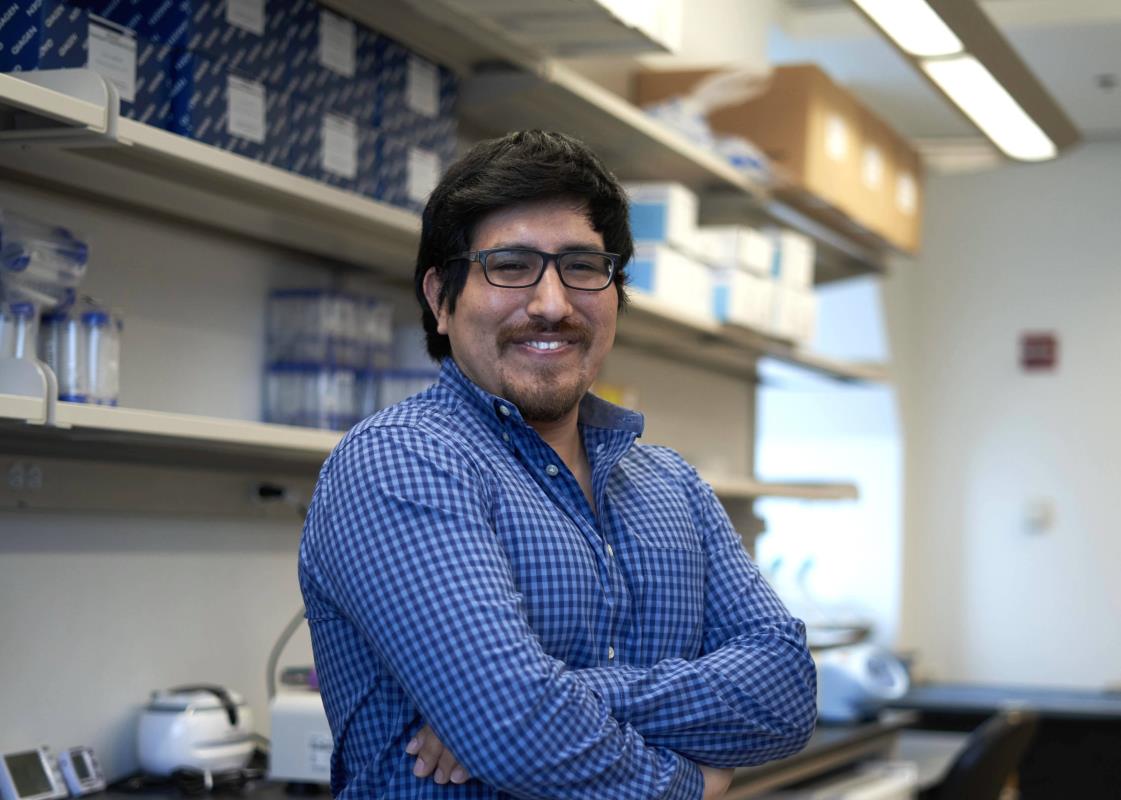Daniel Fernando Zegarra-Ruiz

Assistant Professor, Microbiology, Immunology, and Cancer Biology
- BS, Pharmacy and biochemistry, Universidad Peruana Cayetano Heredia
- PhD, Immunobiology, Yale University
Biology, Immunology, Microbiology, Translational Science
Unraveling the role of host microbe interactions in autoimmune diseases
Autoimmune diseases are a major health problem affecting over 200 million people worldwide and represent one of the leading causes of death for women under 65 years old. Although these pathologies are increasing in prevalence and often lead to multi-organ dysfunction, current treatments for autoimmune diseases are mostly aimed at suppressing the immune system without treating the cause, which usually leads to serious side effects and long-term sequelae. Therefore, finding safer approaches is key to effectively controlling these chronic and debilitating disorders. Systemic lupus erythematosus (SLE) is a prototypical autoimmune disease leading to chronic inflammation in multiple organs due to adaptive immune responses to self-antigens. Although the etiology of autoimmunity remains unknown, multiple autoimmune diseases, including SLE, are linked with intestinal dysbiosis. Dysbiosis is characterized by alterations of the gut microbial communities, which can exhibit pathobiont overgrowth and/or loss of beneficial bacteria. We and others have shown that lupus development is linked with intestinal dysbiosis in patients and mouse models. I previously found an increase in pathobionts such as Lactobacillus reuteri and Enterococcus gallinarum in lupus mouse models and subsets of SLE patients. Strikingly, in mouse models, intestinal overgrowth of these pathobionts was followed by intestinal permeability and systemic translocation, which dysregulated immune pathways leading to increased systemic inflammation and worsened lupus pathogenesis. In SLE, we showed that microbiota-specific T cell responses occur; however, how microbiota-specific T cells arise and modulate lupus progression is not known. Therefore, in my postdoctoral training I focused on how generation and differentiation of microbiota-specific T cells are regulated during postnatal development. While we and others find peripheral expansion of microbiota-specific T cells in adult mice, surprisingly in young mice we found microbiota-specific T cells first expanded in the thymus, a site not previously known to allow for antigen-specific T cell expansion. Upon bacterial re-encounter these cells differentiated into microbiota-specific effector T cells and exacerbated intestinal inflammation in immunodeficient hosts. Our data suggests that intestinal colonization controls the development of thymic microbiota-specific T cells which can modulate inflammatory processes. Because of these findings, my research aims to determine how microbiota-specific T cells, environmental factors, and intestinal inflammation modulate lupus pathogenesis.
Dr. Daniel F. Zegarra-Ruiz was born and raised in Peru, where he received his BS in Pharmacy and Biochemistry in 2013. Before concluding his undergraduate studies, he did an internship at Vanderbilt University. He received his PhD in Immunobiology from Yale University in the lab of Dr. Martin Kriegel in 2018, where he identified intestinal microbes and metabolites that can regulate intestinal and systemic inflammation and alter disease outcomes. He then joined the lab of Dr. Gretchen Diehl (first at Baylor College of Medicine and then at Memorial Sloan Kettering Cancer Center). During his postdoctoral training he continued to investigate how intestinal microbes can modulate immune processes involved in health and disease. Particularly, he found an early life developmental window that allows for trafficking of intestinal microbes to the thymus which drives expansion of microbiota-recognizing T cells. In his laboratory, Dr. Zegarra-Ruiz will refine the way we approach disease development and therapeutics by uncovering the intricate relationship between gut microbiota and autoimmune pathogenesis.
Selected Publications
List of the most up-to-date publications: https://www.ncbi.nlm.nih.gov/myncbi/daniel.zegarra%20ruiz.1/bibliography/public/
2023
Hill, A. A., Kim, M., Zegarra-Ruiz, D. F., Chang, L. -C., Norwood, K., Assie, A., . . . Diehl, G. E. (2023). Acute high-fat diet impairs macrophage- supported intestinal damage resolution. JCI INSIGHT, 8(3). doi:10.1172/jci.insight.164489
2022
Wu, W. -J. H., Kim, M., Chang, L. -C., Assie, A., Saldana-Morales, F. B., Zegarra-Ruiz, D. F., . . . Diehl, G. E. (2022). Interleukin-1β secretion induced by mucosa-associated gut commensal bacteria promotes intestinal barrier repair. GUT MICROBES, 14(1). doi:10.1080/19490976.2021.2014772
Zegarra Ruiz, D. F., Kim, D. V., Norwood, K., Saldana-Morales, F. B., Kim, M., Ng, C., . . . Diehl, G. E. (2022). Microbiota manipulation to increase macrophage IL-10 improves colitis and limits colitis-associated colorectal cancer. GUT MICROBES, 14(1). doi:10.1080/19490976.2022.2119054
2021
Zegarra-Ruiz, D. F., Kim, D. V., Norwood, K., Kim, M., Wu, W. -J. H., Saldana-Morales, F. B., . . . Diehl, G. E. (2021). Thymic development of gut-microbiota-specific T cells. NATURE, 594(7863), 413-+. doi:10.1038/s41586-021-03531-1
2020
Wu, W. -J. H., Zegarra-Ruiz, D. F., & Diehl, G. E. (2020). Intestinal Microbes in Autoimmune and Inflammatory Disease. FRONTIERS IN IMMUNOLOGY, 11. doi:10.3389/fimmu.2020.597966
2019
Zegarra-Ruiz, D. F., & Diehl, G. E. (2019). Skin IL-17-Producing T Cells Support Repair 2!. TRENDS IN IMMUNOLOGY, 40(3), 177-179. doi:10.1016/j.it.2019.01.004
2018
Zegarra-Ruiz, D. F., El Beidaq, A., Iniguez, A. J., Di Ricco, M. L., Vieira, S. M., Ruff, W. E., . . . Kriegel, M. A. (2019). A Diet-Sensitive Commensal Lactobacillus Strain Mediates TLR7-Dependent Systemic Autoimmunity. CELL HOST & MICROBE, 25(1), 113-+. doi:10.1016/j.chom.2018.11.009
Greiling, T. M., Dehner, C., Chen, X., Hughes, K., Iniguez, A. J., Boccitto, M., . . . Kriegel, M. A. (2018). Commensal orthologs of the human autoantigen Ro60 as triggers of autoimmunity in lupus. SCIENCE TRANSLATIONAL MEDICINE, 10(434). doi:10.1126/scitranslmed.aan2306
Vieira, S. M., Hiltensperger, M., Kumar, V., Zegarra-Ruiz, D., Dehner, C., Khan, N., . . . Kriegel, M. A. (2018). Translocation of a gut pathobiont drives autoimmunity in mice and humans. SCIENCE, 359(6380), 1156-1160. doi:10.1126/science.aar7201
